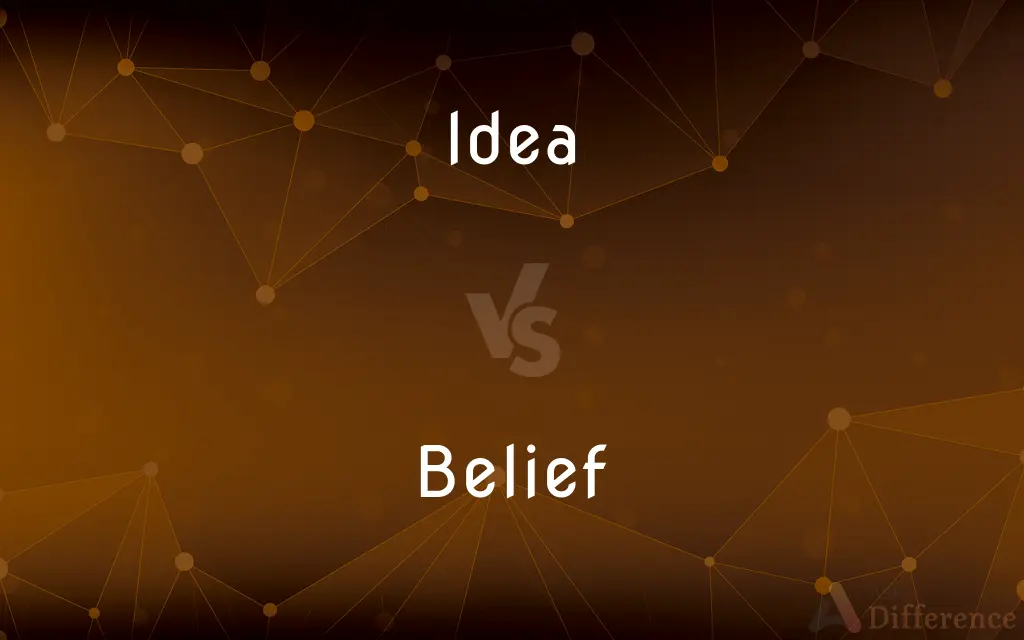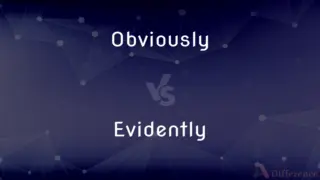Idea vs. Belief — What's the Difference?
By Maham Liaqat & Fiza Rafique — Updated on March 12, 2024
An idea is a thought or concept formed in the mind, potentially leading to innovation or creative thinking, while belief is a conviction or acceptance that something is true or exists, often without the need for empirical evidence.

Difference Between Idea and Belief
Table of Contents
ADVERTISEMENT
Key Differences
An idea represents the initial stage of thinking, where creativity and innovation begin. It's the conceptual seed that can grow into theories, inventions, or solutions to problems. On the other hand, belief is more about the acceptance and conviction regarding the truth of concepts, principles, or assertions, often held with confidence despite the absence of empirical evidence.
Ideas are often fluid and open to development or abandonment as they are explored or analyzed. They thrive on questioning, investigation, and the pursuit of knowledge. Beliefs, however, tend to be more static, forming a foundation for an individual's worldview or understanding of reality. They are not as easily swayed by new information unless the individual is open to changing deeply held convictions.
The generation of ideas is a crucial step in the creative process, leading to innovation and problem-solving across various domains, including science, technology, and the arts. While beliefs can also inspire action and innovation, they do so by providing a motivational and ethical framework rather than acting as direct seeds for creativity.
Ideas can be shared, modified, and developed collaboratively, often benefiting from diverse perspectives and critical thinking. Beliefs, in contrast, are deeply personal and can be more challenging to modify through discussion or persuasion, as they are closely tied to an individual's identity and values.
Despite these differences, ideas and beliefs are interconnected, with beliefs influencing the formation of ideas and ideas potentially reshaping beliefs. This dynamic interplay shapes individual perspectives and, by extension, cultures and societies, highlighting the profound impact both concepts have on human thought and action.
ADVERTISEMENT
Comparison Chart
Definition
A thought or concept formed in the mind.
A conviction or acceptance that something is true or exists.
Nature
Fluid, open to development and change.
More static, held with confidence even without evidence.
Role in Creativity
Acts as a seed for creativity and innovation.
Provides a motivational and ethical framework.
Influence
Can be shared and developed through collaboration.
Personal and tied to identity, more resistant to change.
Foundation
Based on curiosity and the pursuit of knowledge.
Based on conviction, often without the need for evidence.
Compare with Definitions
Idea
A notion or hypothesis.
The scientist proposed a new idea about quantum mechanics.
Belief
A religious conviction.
His beliefs shape his moral and ethical decisions.
Idea
A suggestion or proposal.
He brought up an idea for improving team productivity.
Belief
Trust, faith, or confidence in someone or something.
I have a strong belief in the project's success.
Idea
An innovative or creative thought.
The inventor's idea revolutionized the industry.
Belief
An opinion or conviction.
The belief that hard work pays off is central to her philosophy.
Idea
A plan or intention.
They had an idea to start a podcast on history.
Belief
Acceptance that something exists or is true, especially without proof.
Her belief in extraterrestrial life is unwavering.
Idea
A mental impression or concept.
The idea for the novel came to her in a dream.
Belief
A principle accepted as true or held as an opinion.
The community's beliefs include the importance of hospitality.
Idea
In common usage and in philosophy, ideas are abstract concepts. Also in philosophy, ideas can also be mental representational images of some object.
Belief
The mental act, condition, or habit of placing trust or confidence in another
My belief in you is as strong as ever.
Idea
A thought or suggestion as to a possible course of action
Recently, the idea of linking pay to performance has caught on
It's a good idea to do some research before you go
Belief
A belief is an attitude that something is the case, or that some proposition about the world is true. In epistemology, philosophers use the term "belief" to refer to attitudes about the world which can be either true or false.
Idea
The aim or purpose
I took a job with the idea of getting some money together
Belief
Mental acceptance of and conviction in the truth, actuality, or validity of something
His explanation of what happened defies belief.
Idea
(in Platonic thought) an eternally existing pattern of which individual things in any class are imperfect copies.
Belief
Something believed or accepted as true, especially a particular tenet or a body of tenets accepted by a group of persons.
Idea
Something, such as a thought or conception, that is the product of mental activity.
Belief
Mental acceptance of a claim as true.
It's my belief that the thief is somebody known to us.
Idea
An opinion, conviction, or principle
Has some strange political ideas.
Belief
Faith or trust in the reality of something; often based upon one's own reasoning, trust in a claim, desire of actuality, and/or evidence considered.
My belief is that there is a bear in the woods. Bill said he saw one.
Based on this data, it is our belief that X does not occur.
Idea
A plan, purpose, or goal
She started school with the idea of becoming a doctor.
Belief
(countable) Something believed.
The ancient people have a belief in many deities.
Idea
The gist or significance
The idea of the article is that investing in green technology can save you money in the long run.
Belief
(uncountable) The quality or state of believing.
My belief that it will rain tomorrow is strong.
Idea
A sense that something can happen; a notion or expectation
They have this idea that we can just drop what we're doing and go to the park.
Belief
(uncountable) Religious faith.
She often said it was her belief that carried her through the hard times.
Idea
(Music) A theme or motif.
Belief
(in the plural) One's religious or moral convictions.
I can't do that. It's against my beliefs.
Idea
In the philosophy of Plato, a non-physical form or archetype to which beings in phenomenal reality correspond only as imperfect replicas.
Belief
Assent to a proposition or affirmation, or the acceptance of a fact, opinion, or assertion as real or true, without immediate personal knowledge; reliance upon word or testimony; partial or full assurance without positive knowledge or absolute certainty; persuasion; conviction; confidence; as, belief of a witness; the belief of our senses.
Belief admits of all degrees, from the slightest suspicion to the fullest assurance.
Idea
In the philosophy of Kant, a concept of reason that is transcendent but nonempirical.
Belief
A persuasion of the truths of religion; faith.
No man can attain [to] belief by the bare contemplation of heaven and earth.
Idea
In the philosophy of Hegel, absolute truth; the complete and ultimate product of reason.
Belief
The thing believed; the object of belief.
Superstitious prophecies are not only the belief of fools, but the talk sometimes of wise men.
Idea
(Obsolete) A mental image of something remembered.
Belief
A tenet, or the body of tenets, held by the advocates of any class of views; doctrine; creed.
In the heat of persecution to which Christian belief was subject upon its first promulgation.
Idea
(philosophy) An abstract archetype of a given thing, compared to which real-life examples are seen as imperfect approximations; pure essence, as opposed to actual examples.
Belief
Any cognitive content held as true
Idea
(obsolete) The conception of someone or something as representing a perfect example; an ideal.
Belief
A vague idea in which some confidence is placed;
His impression of her was favorable
What are your feelings about the crisis?
It strengthened my belief in his sincerity
I had a feeling that she was lying
Idea
(obsolete) The form or shape of something; a quintessential aspect or characteristic.
Idea
An image of an object that is formed in the mind or recalled by the memory.
The mere idea of you is enough to excite me.
Idea
More generally, any result of mental activity; a thought, a notion; a way of thinking.
Idea
A conception in the mind of something to be done; a plan for doing something, an intention.
I have an idea of how we might escape.
Idea
A purposeful aim or goal; intent
Yeah, that's the idea.
Idea
A vague or fanciful notion; a feeling or hunch; an impression.
He had the wild idea that if he leant forward a little, he might be able to touch the mountain-top.
Idea
(music) A musical theme or melodic subject.
Idea
The transcript, image, or picture of a visible object, that is formed by the mind; also, a similar image of any object whatever, whether sensible or spiritual.
Her sweet idea wandered through his thoughts.
Being the right idea of your fatherBoth in your form and nobleness of mind.
This representation or likeness of the object being transmitted from thence [the senses] to the imagination, and lodged there for the view and observation of the pure intellect, is aptly and properly called its idea.
Idea
A general notion, or a conception formed by generalization.
Alice had not the slightest idea what latitude was.
Idea
Hence: Any object apprehended, conceived, or thought of, by the mind; a notion, conception, or thought; the real object that is conceived or thought of.
Whatsoever the mind perceives in itself, or as the immediate object of perception, thought, or undersanding, that I call idea.
Idea
A belief, option, or doctrine; a characteristic or controlling principle; as, an essential idea; the idea of development.
That fellow seems to me to possess but one idea, and that is a wrong one.
What is now "idea" for us? How infinite the fall of this word, since the time where Milton sang of the Creator contemplating his newly-created world, -"how it showed . . . Answering his great idea," -to its present use, when this person "has an idea that the train has started," and the other "had no idea that the dinner would be so bad!"
Idea
A plan or purpose of action; intention; design.
I shortly afterwards set off for that capital, with an idea of undertaking while there the translation of the work.
Idea
A rational conception; the complete conception of an object when thought of in all its essential elements or constituents; the necessary metaphysical or constituent attributes and relations, when conceived in the abstract.
Idea
A fiction object or picture created by the imagination; the same when proposed as a pattern to be copied, or a standard to be reached; one of the archetypes or patterns of created things, conceived by the Platonists to have excited objectively from eternity in the mind of the Deity.
Thence to behold this new-created world,The addition of his empire, how it showedIn prospect from his throne, how good, how fair,Answering his great idea.
Idea
The content of cognition; the main thing you are thinking about;
It was not a good idea
The thought never entered my mind
Idea
A personal view;
He has an idea that we don't like him
Idea
An approximate calculation of quantity or degree or worth;
An estimate of what it would cost
A rough idea how long it would take
Idea
Your intention; what you intend to do;
He had in mind to see his old teacher
The idea of the game is to capture all the pieces
Idea
(music) melodic subject of a musical composition;
The theme is announced in the first measures
The accompanist picked up the idea and elaborated it
Common Curiosities
What is a belief?
A belief is the acceptance or conviction that something is true or exists, often held with confidence and without the need for empirical evidence.
What is an idea?
An idea is a concept or mental impression that forms in the mind, representing the initial stage of thought, creativity, or planning.
Are ideas always based on facts?
Not necessarily. Ideas can be based on observations, imagination, speculation, or facts, and they are often the starting point for exploration and discovery.
Can an idea become a belief?
An idea can evolve into a belief if it is repeatedly reinforced and accepted as true or valuable without the need for ongoing proof.
Can beliefs influence ideas?
Yes, beliefs can significantly influence the formation of ideas by providing a framework of values and understandings through which ideas are conceived.
How do ideas differ from beliefs?
Ideas are conceptual and open to development or change, focused on creativity and innovation, while beliefs are convictions held with confidence, often without requiring evidence.
What role do ideas play in innovation?
Ideas are the seeds of innovation, providing the initial spark for creative solutions, inventions, and new approaches to problems.
What is the importance of sharing ideas?
Sharing ideas is crucial for collaboration, the development of new concepts, and the advancement of knowledge and innovation across fields.
How do beliefs form?
Beliefs form through a combination of personal experiences, cultural influences, education, and the acceptance of information from trusted sources.
Can ideas and beliefs coexist harmoniously?
Yes, ideas and beliefs can coexist harmoniously when there is openness to exploring new concepts while holding personal convictions.
How do societies shape beliefs?
Societies shape beliefs through cultural norms, values, education systems, and shared experiences, influencing the collective understanding of reality.
Is it possible to change a belief?
Yes, it's possible to change a belief, especially when presented with compelling evidence or experiences that challenge the original conviction.
Why is it important to examine our beliefs and ideas?
Examining our beliefs and ideas is important for personal growth, the development of a well-rounded worldview, and the promotion of understanding and empathy.
How can beliefs impact behavior?
Beliefs have a significant impact on behavior by motivating actions, shaping decisions, and influencing how individuals interact with the world around them.
Are all beliefs religious or spiritual?
Not all beliefs are religious or spiritual; beliefs can also encompass convictions about reality, ethics, and personal principles.
Share Your Discovery

Previous Comparison
Obviously vs. Evidently
Next Comparison
Parlor vs. RestaurantAuthor Spotlight
Written by
Maham LiaqatCo-written by
Fiza RafiqueFiza Rafique is a skilled content writer at AskDifference.com, where she meticulously refines and enhances written pieces. Drawing from her vast editorial expertise, Fiza ensures clarity, accuracy, and precision in every article. Passionate about language, she continually seeks to elevate the quality of content for readers worldwide.














































